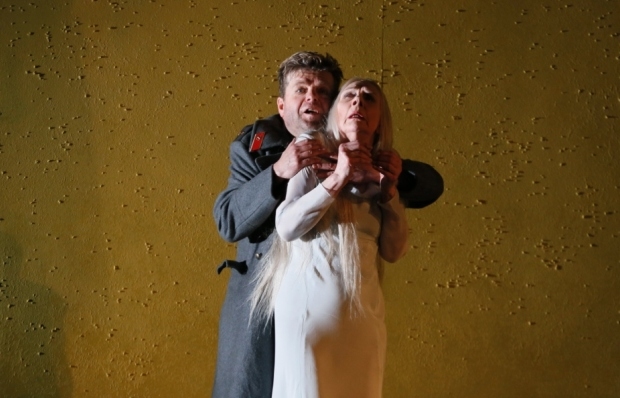The Queen of Spades (London Coliseum)
Edward Gardner ends his tenure at ENO with Tchaikovsky’s tuneful chiller

© ENO/Donald Cooper
Edward Gardner may well agree, because he's chosen it for his farewell production as English National Opera's music director (although he'll be back as a hired hand next season to conduct Tristan und Isolde). The ENO Orchestra responds to his presence with a lustrous, symphonic account of the score that overflows with the power of its drama. These musicians are a living tribute to the man who's been ENO's arrowhead for the past eight years. Is there a better opera orchestra anywhere? I doubt it. A body of string players who can dash off Tchaikovsky's presto writing with such insouciant precision are at the peak of their collective powers.
The Queen of Spades (Pikovaya dama) is a cautionary tale about gambling, greed and obsession. Laced with the supernatural, it traces one man's pursuit of wealth at the cost of his love, peace of mind and, ultimately, reason. It is, as Gavin Plumley observes in a programme note, "a private tragedy enclosed by public spectacle" as the protagonist, Herman, plunges hellward beneath the eyes of a watching world.
David Alden's new production, though, presents the entire opera as a psychotic episode within Herman's fractured mind. Even the humdrum opening scene, ostensibly set within a military officers' drawing room, here finds him abed in a sanatorium, his comrades possibly — probably — hallucinatory figments.
'a living legend'
It's a set-up that means all bets are off for the next three hours, and Alden doesn't disappoint — even though his signature ideas (grubby walls and jumbled furniture dominate Gideon Davey's designs) have grown increasingly familiar over the years. Little we see should be taken at face value; indeed there's a fair chance that none of it even happens. Engaging with that possibility is part of the excitement.
It doesn't hurt that, to play Herman, Alden and ENO have called on one of our most devil-may-care actor-singers, Peter Hoare. Best known as a character tenor, Hoare reveals an ace up his sleeve as he embraces the role's overflowing lyricism and for the most part makes light of Tchaikovsky's tessitura demands.
The cast includes two classy visitors from across the pond: Canadian Gregory Dahl as Count Tomsky, sensational in his delivery of the 'Three cards' sequence, and Nicholas Pallesen from the US, a dashing presence both vocally and physically as Prince Yeletsky. Both have miraculous diction and render the surtitles superfluous. Giselle Allen offers more passion than clarity as Herman's beloved Lisa, but her interpretation is no less enthralling.
Most unforgettable of all in a company of remarkable depth (and that includes the ENO Chorus) is a performance by Felicity Palmer as the ancient Countess, and keeper of the mystic secret of the cards, that's extraordinary in its definition. To witness this mesmerising singer in centre-stage isolation, articulating the opera's interpolated Grétry aria "Je crains de lui parler la nuit" in a true mezza voce, was a privilege. Hear it for yourself if you can, because Palmer is a living legend and she's still got it. In spades.












